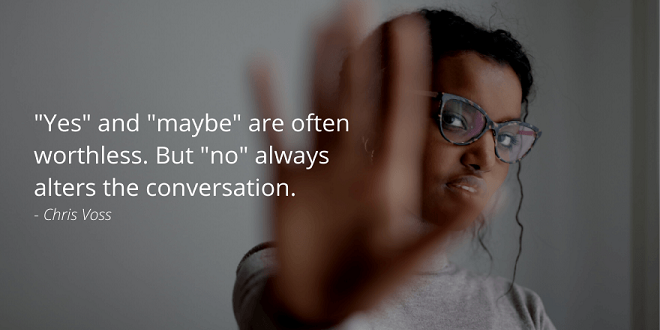
Don’t compromise
Let’s go back to the $150,000 ransom demand. We’re always taught to look for the win-win solution, to accommodate, to be reasonable. So what’s the win-win here? What’s the compromise? The traditional negotiating logic that’s drilled into us from an early age, the kind that exalts compromises, says, “Let’s just split the difference and offer them $75,000. Then everyone’s happy.”
Deadlines: make time your ally
Time is one of the most crucial variables in any negotiation. The simple passing of time and its sharper cousin, the deadline, are the screw that pressures every deal to a conclusion.
Whether your deadline is real and absolute or merely a line in the sand, it can trick you into believing that doing a deal now is more important than getting a good deal. Deadlines regularly make people say and do impulsive things that are against their best interests, because we all have a natural tendency to rush as a deadline approaches.
No such thing as fair
In the third week of my negotiations class, we play my favorite type of game, that is, the kind that shows my students how much they don’t understand themselves.
It’s called the Ultimatum Game, and it goes like this: After the students split into pairs of a “proposer” and an “accepter,” I give each proposer $10. The proposer then has to offer the accepter a round number of dollars. If the accepter agrees he or she receives what’s been offered and the proposer gets the rest. If the accepter refuses the offer, though, they both get nothing and the $10 goes back to me
The f-word: why it’s so powerful, when to use it, and how
The most powerful word in negotiations is “Fair.” As human beings, we’re mightily swayed by how much we feel we have been respected. People comply with agreements if they feel they’ve been treated fairly and lash out if they don’t. A decade of brain-imaging studies has shown that human neural activity, particularly in the emotion-regulating insular cortex, reflects the degree of unfairness in social interactions. Even nonhuman primates are hardwired to reject unfairness. In one famous study, two capuchin monkeys were set to perform the same task, but one was rewarded with sweet grapes while the other received cucumbers.
How to discover the emotional drivers behind what the other party values
A few years ago, I stumbled upon the book How to Become a Rainmaker, 3 and I like to review it occasionally to refresh my sense of the emotional drivers that fuel decisions. The book does a great job to explain the sales job not as a rational argument, but as an emotional framing job. If you can get the other party to reveal their problems, pain, and unmet objectives—if you can get at what people are really buying—then you can sell them a vision of their problem that leaves your proposal as the perfect solution. Look at this from the most basic level. What does a good babysitter sell, really? It’s not child care exactly, but a relaxed evening. A furnace salesperson? Cozy rooms for family time. A locksmith? A feeling of security.
Bend their reality
Take the same person, change one or two variables, and $100 can be a glorious victory or a vicious insult. Recognizing this phenomenon lets you bend reality from insult to victory. Let me give you an example. I have this coffee mug, red and white with the Swiss flag. No chips, but used. What would you pay for it, deep down in your heart of hearts? You’re probably going to say something like $3.50. Let’s say it’s your mug now. You’re going to sell it to me. So tell me what it’s worth. You’re probably going to say something between $5 and $7. In both cases, it was the exact same mug. All I did was move the mug in relation to you, and I totally changed its value.
Anchor their emotions
To bend your counterpart’s reality, you have to start with the basics of empathy. So start out with an accusation audit acknowledging all of their fears. By anchoring their emotions in preparation for a loss, you inflame the other side’s loss aversion so that they’ll jump at the chance to avoid it.
On my first consulting project after leaving the FBI, I received the honor to train the national hostage negotiation team for the United Arab Emirates. Unfortunately, the prestige of the assignment was tempered during the project by problems with the general contractor (I was a subcontractor). The problems became so bad that I was going to have to go back to the contractors I’d signed up, who normally got $2,000 a day, and tell them that for several months, I could only offer $500.
Let the other guy go first . . . Most of the time.
Now, it’s clear that the benefits of anchoring emotions are great when it comes to bending your counterpart’s reality. But going first is not necessarily the best thing when it comes to negotiating price. When the famous film director Billy Wilder went to hire the famous detective novelist Raymond Chandler to write the 1944 classic Double Indemnity, Chandler was new to Hollywood. But he came ready to negotiate, and in his meeting with Wilder and the movie’s producer, Chandler made the first salary offer: he bluffly demanded $150 per week and warned Wilder that it might take him three weeks to finish the project.
Last Word
While going first rarely helps, there is one way to seem to make an offer and bend their reality in the process. That is, by alluding to a range. What I mean is this: When confronted with naming your terms or price, counter by recalling a similar deal that establishes your “ballpark,” albeit the best possible ballpark you wish to be in. Instead of saying, “I’m worth $110, 000,” Jerry might have said, “At top places like X Corp., people in this job get between $130,000 and $170,000.”




